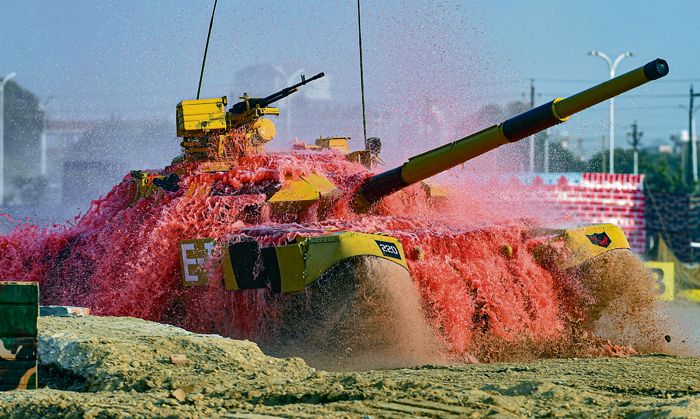
SOURCE: The Tribune
To expedite military reforms, as suggested recently by Finance Minister Nirmala Sitharaman, in times of severe recession generated by Covid-19, the Ministry of Defence (MoD) could do well to dust off a three-year-old management and services expert committee report. Submitted to the MoD in 2017, the 200-odd-page report had recommended the establishment of a semi-independent body to streamline and accelerate materiel procurements for India’s continually postponed military modernisation. Located away from New Delhi’s security zone, where access to officials is controlled, its overall control, however, would remain with the MoD.
The report had advocated the establishment of a Defence Capability Acquisition Authority (DCAA) to manage all aspects of defence equipment acquisitions for all three services. It envisaged the intended authority with around 900 members to work outside the MoD, which, for decades, has been plagued by time-consuming procurement procedures, internecine rivalries and corruption scandals.
Headed by Dr Pritam Singh, formerly of the IIM, Lucknow, the eight-member committee was instituted by the MoD in 2016, and included serving and retired two and three-star service officers, financial and technical experts. Over seven months, the committee interacted with materiel procurement officials from France, South Korea, the UK and the US as well as the Indian military, Integrated Defence Staff and the Indian Coast Guard. Specialists from local think tanks, industry associations and the state-run Defence Research and Development Organisation (DRDO), too, were consulted.
Thereafter, the committee suggested dividing the DCAA into seven ‘vertical’ units dealing with land, air, maritime, science and technology, industrial collaborations, and commercial and legal issues. It stressed the importance of integrated project management teams or assorted programmes with strict financial and completion deadlines to reduce dependency on imported materiel, and augment self-reliance.
In short, the authority would be an independent body manned by a cadre of technical and military professionals with domain knowledge, as well as accountability and flexibility to augment India’s military capabilities.
Most importantly, the DCAA would have overarching responsibility for all military procurements, including formulating qualitative requirements (QRs) for equipment, issuing requests for information (RfIs) and request for proposals (RfPs), overseeing trials, conducting price negotiations, and managing offset obligations. All such matters were presently handled or mishandled by a miasma of military and MoD departments, which either worked at cross-purposes, or not at all.
The prevailing procurement system directed by successive editions of the Defence Procurement Procedure (DPP) since 2002 is riddled with Byzantine processes, resulting in delays. The DPP-2020, for instance, that is to succeed DPP-2016, is under formulation. But the latter runs into over 700 pages, many of which in the draft version remain largely incomprehensible, bewilderingly interlacing civil and military bureaucratese.
The FM has stressed the formulation of ‘realistic’ general staff qualitative requirements (GSQRs) for desired equipment to fast-track procurements. It remains an open, but shameful secret that over the years, the services had impeded their modernisation by framing impracticable and poorly drafted GSQRs. In 2015, this had prompted then Defence Minister Manohar Parrikar to declare publicly that some of the military’s QRs appeared to be ‘out of Marvel comic books’ because the technologies and capabilities they specified were ‘absurd and unrealistic’.
The process of drawing up RfIs and RfPs is executed with limited knowledge and blinkered views, especially by the Army. Poorly conceived, formulated and drafted QRs create confusion and delays, resulting in the entire process either being aborted at an advanced stage or re-tendered, only to be terminated yet again.
In its report tabled in Parliament in 2012, the Defence Parliamentary Committee declared that 41 of the Army’s RfPs for diverse equipment had, in recent years, been withdrawn or terminated for varied reasons, included faulty GSQRs and stringent or overambitious GSQRs.
‘There are certain stages where exclusively the jurisdiction is with Service Headquarters’, the committee report declared, pinning responsibility on the Army. The MoD and attendant financial advisers, it stated, had no role whatsoever in framing weapon QRs, their responsibilities coming into play much later.
The report goes on to state that all Army GSQRs are formulated jointly by the Service Headquarters in consultation with the largely uniformed Directorate General Quality Assurance (DGQA), and, at times, with input from the DRDO. GSQRs are formulated in response to RfIs, ahead of issuing the RfP. All available literature on the proposed equipment is gathered and its multiple characteristics collated, with the aim of including as many features as possible to demonstrate the exhaustiveness of the task undertaken and the enthusiasm of the officer concerned.
As the draft travels up the chain of command, it gathers additional parameters, as each officer feels compelled to suggest supplementary accompaniments. Deletions are rarely effected and the final QR takes the shape of a well-compiled wish list of utopian dimensions, which in many instances, simply does not exist.
Space constraints do not countenance the long list of terminated tenders. In 2012, the then Army Chief Gen VK Singh had stated that military procurements were a ‘version of snakes and ladders, where there is no ladder, but only snakes’. He had further warned that if the snakes bite, the entire process comes back to zero.
Perhaps the current economic predicament can be an opportunity for ushering in realistic military reforms and foreclosing the possibility of notching a zero.
https://defencenewsofindia.com/time-to-revisit-the-2017-report-recommending-comprehensive-changes/






